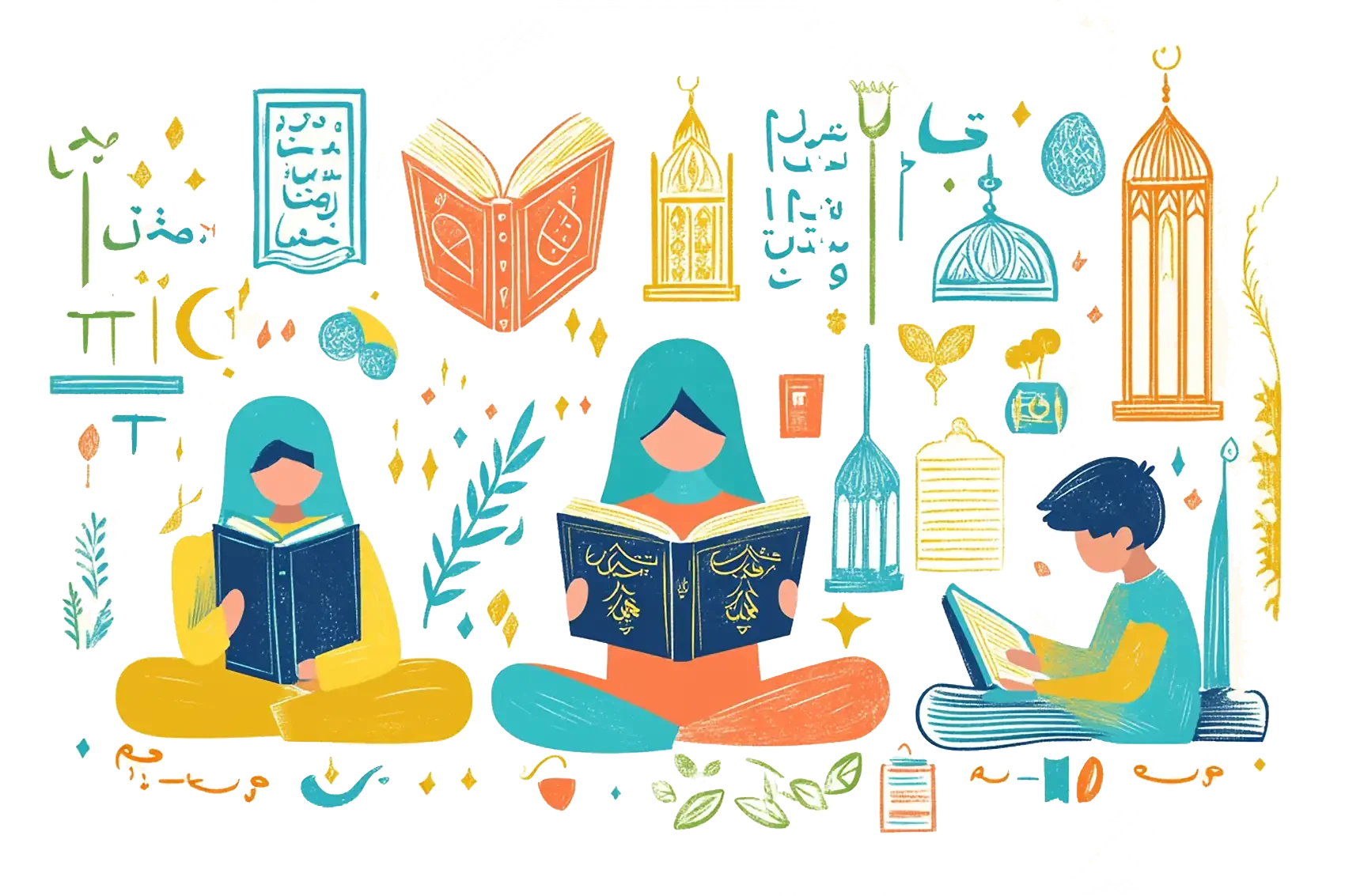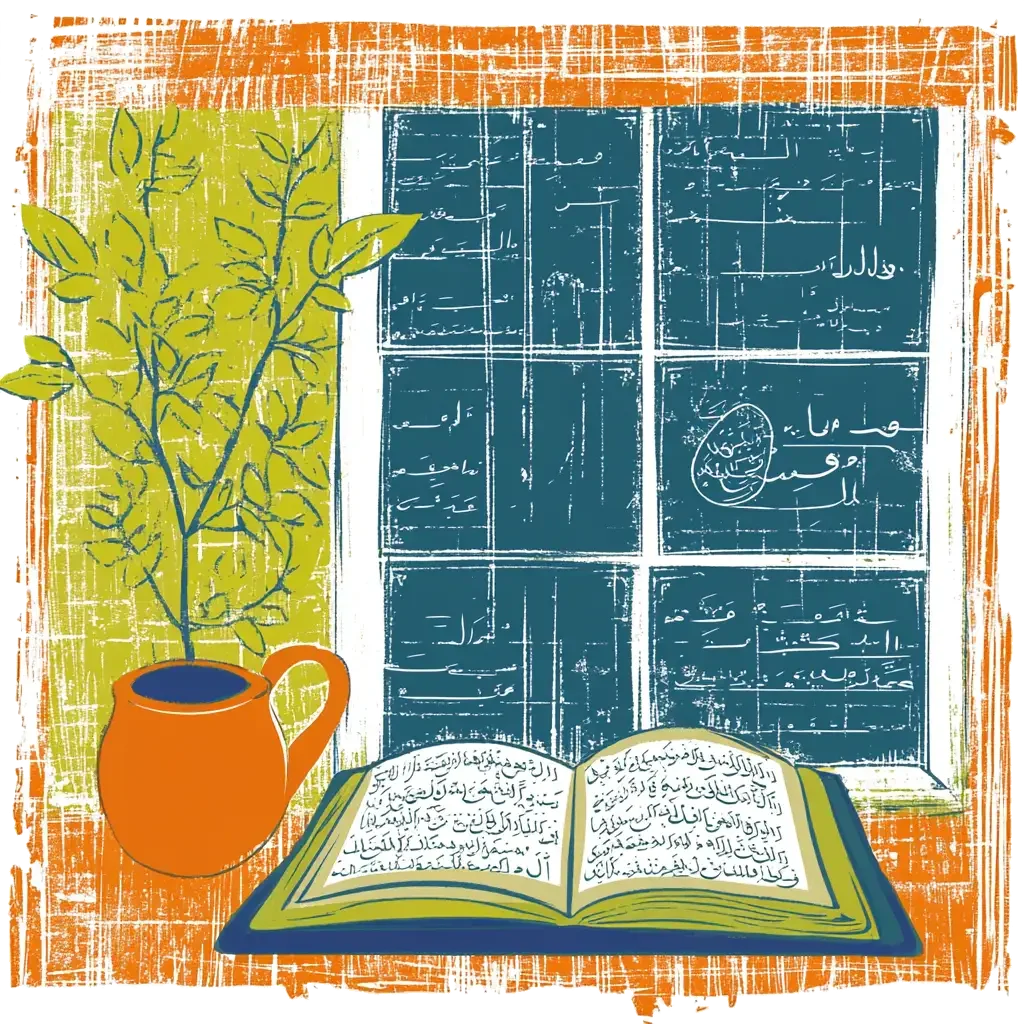Qur’an Recitation & Tajweed
Some of the most lasting childhood memories are made through sound—especially the sound of Qur’an recited well. This program helps children build that gift: a recitation that is clear, steady, and correct, developed through patient teacher modeling, gentle correction, and small daily practice. Over time, students strengthen makhārij, apply tajwīd with accuracy, and develop a calm tarteel—so recitation becomes both precise and beloved.
A Learning Journey That Builds with Your Child
Sufuuf al-Khayr blends one recorded lesson each week (to model the rule and sound) with one focused 1-on-1 live session (30 min) for correction, pacing, and confidence. Materials include Uthmani-script mushaf, printable drills, and short audio loops so parents can easily support 10–15 minutes/day at home.
Riwayah: Hafs ʿan ʿAsim (Uthmani script)
Method: Talqeen (listen–repeat), bite-size rule application, review cycles
Format: 12-week courses; three consecutive courses form one level
Accuracy First: Qur’an lessons are primarily 1-on-1 to protect precision and build poise
Reading Support: If a child is still learning letters/vowels, we blend essentials from Arabic Level 1–2 so recitation can grow smoothly in parallel
Progressive Stages
Foundations (ages 6–8)
What we teach:
Short vowels; establishing makharij (letter articulation) and beginner waqf (stopping at the end of words/ayat).What they can do:
Recite short phrases and simple ayat accurately at a slow pace, clearly distinguishing similar letters (ث/س/ص, د/ض, ق/ك, ع/ح/غ/خ).
Intermediate (ages 9–11)
What we teach:
Madd (counts and stability), Hamzatul-Wasl vs. Hamzatul-Qatʿ, lam shamsiyyah/qamariyyah, stopping on ta’ marbutah, and basic waqf/ibtidaʾ (stop–restart).What they can do:
Recite connected verses with smoother flow, apply stops/restarts appropriately, and keep steady counts and tone.
Advanced (ages 11–13)
What we teach:
Nun sakinah & tanween (izhar, idgham, iqlab, ikhfaʾ), Meem sakinah rules, qalqalah, sound changes at pause, consolidated madd practice, and tarqeeq of “Allah.”What they can do:
Recite extended passages with fluent rule application, consistent ghunnah timing, and a composed, pleasant tarteel suitable for prayer and school/masjid settings.
Note: Ages are guides; placement is by assessment.
What makes this curriculum unique?
It’s all about a child-friendly approach that ensures students feel comfortable and engaged:
Concepts are explained clearly, with links to English when needed so children don’t feel lost or confused by new ideas.
Stories are chosen to build moral values such as honesty, kindness, and respect.
Activities and worksheets are interactive, encouraging children to think in Arabic rather than relying on direct translation.
Parents receive guidance and tips to support practice at home, so learning continues beyond the classroom.
Program Goals
Build accurate makharij and sifat (distinct letter qualities)
Apply core tajweed rules consistently at each stage
Establish measured pacing (tarteel) and clarity of tone
Develop self-awareness and basic self-correction of slips
Foster a lifelong love of reciting the Qur’an with adab and ease
Learning Milestones
“What I appreciate most is the teacher's patience, encouragement, and personalized approach. The supportive environment has made my child feel comfortable and motivated to strive for their best. The teaching style is practical, compassionate, and highly effective, which has fostered both learning and a deep connection to the material.”
— Hala, United Kingdom
The Sufuuf Learning Journey
Rather than choosing between structure and personalization, we bring both together. Our children work through a carefully sequenced curriculum of recorded lessons and assessments, supported by regular private sessions that adapt learning to the child—not the other way around.
-
Each course follows a 12-week sequence designed to feel steady and manageable. Students learn new material through a recorded lesson, then reinforce it through guided practice, and finally apply it in a live session where the teacher corrects, refines, and builds real fluency.
-
Most families follow a simple weekly rhythm. Early in the week, your child watches one recorded lesson (typically around 20–30 minutes) that introduces new concepts and models correct reading and pronunciation. Midweek is kept light, with short worksheets or drills that take about 10–15 minutes. Toward the end of the week, your child meets the teacher for a live 30-minute 1-to-1 session on Zoom to practice actively, receive feedback, and strengthen accuracy.
-
All learning resources are included: the required PDF textbook(s), lesson slides, audio practice loops, and printable worksheets. Recordings and printables are organized in a parent portal (a simple download area on the website), so you can revisit lessons and keep practice consistent without chasing files.
-
Every student receives a private 30-minute one-to-one class each week. For Arabic, we can also arrange small-group sessions (usually 2–3 learners) when it supports motivation and progress. Qur’an recitation, Tajwīd, and ḥifẓ remain primarily one-to-one, since precision and correction are central to that track.
-
You’ll receive brief weekly notes that highlight progress and give practical guidance—especially what to listen for during reading and pronunciation practice. At the end of the course, we share a clear report outlining strengths, current focus areas, and the most suitable next step in the pathway.
-
Certification
Why Families Choose Sufuuf al-Khayr?
-
We fit around your home, not the other way around. With 1-on-1 lessons offered across time zones and multiple time-slot options, it’s simple to find a rhythm you can keep—week after week.
-
From early readers (6–8) to pre-teens (11–13), goals and teaching styles are age-appropriate and child-friendly. We meet learners where they are, then build up, one step at a time.
-
Your child has the teacher’s full focus. That means immediate correction, calm encouragement, and faster, more confident progress than crowded classes can offer.
-
We cultivate adab, focus, and joy. Lessons are gentle, organized, and uplifting, helping children love what they learn, and who they’re becoming.
“Since joining the program, my child has shown incredible growth, not only in their Qur’anic recitation and understanding of Arabic but also in their overall discipline and enthusiasm for learning. Their progress has been remarkable, and they are now much more confident in their abilities.”
— Yasmin, United States
Frequently Asked Questions
-
Most students begin between 6–8 years of age for Level 1. Older beginners are always welcome; we adapt pacing.
-
Plan on 10–15 minutes/day (very manageable). We provide clear, parent-friendly tasks.
-
All three. Speaking is integrated through short dialogues, retells, and role-play.
-
Ongoing checks in the live session + end-of-course review. Parents receive a concise progress summary with next-step goals.
-
Yes! Textbook PDFs, slides, and worksheets are provided for each course.
-
Yes. Levels 1–2 prepare children for Qur’an reading and Hifz. Many families add or switch in Level 3.







